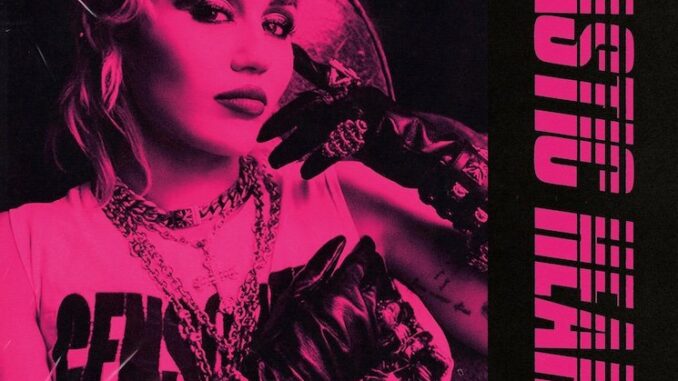
From Disney-starlet to glitter-coated, sledgehammer-licking punk-icon, Miley Cyrus is known as the boundary pushing, shape-shifting idol of the millennial generation. Though there have been many Miley personas, none of them have been as natural and effortless as the ‘80s rock-and-roll goddess she has birthed through Plastic Hearts.
Cyrus’ seventh studio album, Plastic Hearts, was released on Nov. 27, 2020 but a good handful of the tracks were available for streaming months prior. “Midnight Sky” was available since August — a surprisingly mature release that attracted so much comparison to Stevie Nicks’ “Edge of Seventeen” that Cyrus suggested she and the rock legend produce a mash-up remix. The remix, “Edge of Midnight,” also was available several weeks before the release of the LP.
Rock icons are the theme of the album and, while Cyrus was not shy about claiming herself as one, she was also not shy about paying homage to those who first wore the leather. The tribute stretches beyond “Midnight Sky” and the eventual remix. Plastic Hearts sports live covers such as “Zombie” by the Cranberries and a fully belted, gravely rendition of “Heart of Glass” by Blondie — a rendition that prompted Debbie Harry to call Cyrus “a force to be reckoned with.”
The namesake of the album and second track, “Plastic Hearts,” (which is heavier on the pop than the rock) is somewhat Blondie-esque in nature and, writing-wise, undoubtedly to “Heart of Glass” as “Midnight Sky” is to “Edge of Seventeen.” The album also boasts tracks like “Bad Karma,” a slow burn of hard-rock excitement featuring Joan Jett and “Night Crawling,” featuring Billy Idol. The latter bears striking similarities to “See You Again,” the lead single from Meet Miley Cyrus, the singer’s first solo album and the second soundtrack to the Disney Channel original series “Hannah Montana.” Perhaps when we “met her” 13 years ago, we had our first insight into who the pop-star would one day become.
Plastic Hearts is Miley Cyrus’ post divorce album and with it comes a lot of jaded grit. Perhaps this is what makes the studio LP more than just a cheap attempt at an ‘80s facade (which is nothing new for 21st century artists) but a solid work in its own right. From the first stimulant-saturated, thumping-heartbeat track, “WTF Do I Know,” Cyrus makes it clear that she has a lot to say and she knows exactly how she’s going to say it. The ‘80s appearance is simply the convenient package for Miley’s gift of bellowing vocals and her cynical, sometimes hopeless poetry.
Tracks like “Gimme What I Want” ooze post 2010 Miley in all her sexually liberated glory. Unlike Bangerz however (the artist’s fourth studio album) she conveys her good-girl-gone-bad nature in a more grown-up way lyrically, vocally and rhythmically. She chants “I don’t need a future, I don’t need your past / I just need a lover / So gimme what I want or I’ll give it to my-self…”
This jaded maturity is no surprise considering not only her divorce from actor Liam Hemsworth, but also the loss of her home to the Woolsey wildfire in 2018. The fire also took Cyrus’ unfinished EP trilogy She Is in its wake, but Cyrus admitted to Teen Vogue that the fire erased work that was already irrelevant due to the divorce.
Plastic Hearts contains many moving, pop-rock ballads such as “Angels Like You” and “High” — the former having something of an Elton John essence and the latter respecting her country roots. “High” contains hints of Dolly Parton who describes herself as Cyrus’ “honorary godmother.”
Cyrus shines completely on her own in “Golden G String,” her melodious yet bold message to the music industry and the patriarchy. She laments, “And oh, that’s just the world that we’re living in / The old boys hold all the cards and they ain’t playing gin.” To her fans, the ballad is also an explanation for her post-Hannah Montana shenanigans as she sings;
There are layers to this body
Primal sex and primal shame
They told me I should cover it
So I went the other way
I was trying to own my power
Still, I’m trying to work it out
And at least it gives the paper
Something they can write about
Plastic Hearts is a soulful album that filled many of the awkward gaps in Miley Cyrus’ shape-shifting identity. Upon the completion of the 15 tracks, one is filled with the overwhelming sense that Cyrus has come into her own. Underneath the ‘80s homage, Plastic Hearts is the exposed heart of Miley herself — a heart that isn’t necessarily plastic, nor glass — but achy and breaky and totally, utterly unique.
